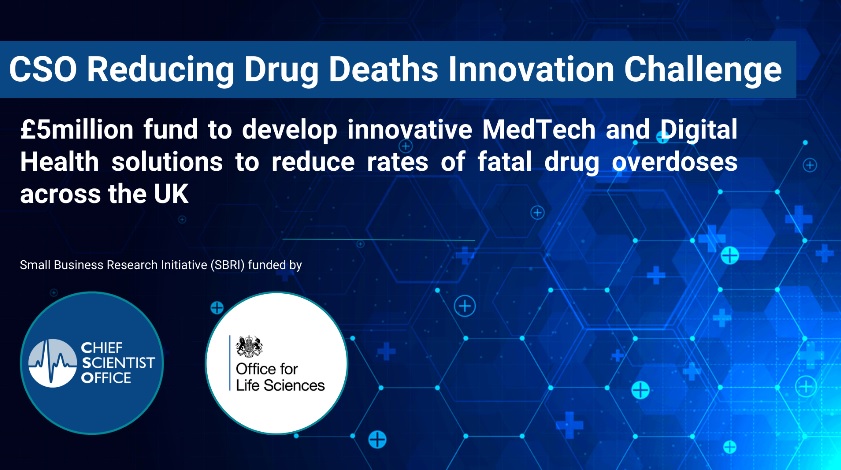
Background
In support of the UK’s Drugs Strategy, From Harm to Hope, and Scottish Government’s National Mission on Drugs, the UK Office for Life Sciences (OLS) and the Scottish Government Chief Scientist Office (CSO), are funding an innovation challenge to develop disruptive innovative solutions that focus on detection of, response to, and intervention in potentially fatal drug overdose episodes. The challenge will be delivered across the 4 U.K. nations with NHS Fife Innovation Team, on behalf of Health Innovation South East Scotland (HISES) acting as the lead Test Bed on behalf of the Chief Scientist Office (CSO), delivery agent for the Innovation Challenge.
The overall competition will be delivered over two challenges.
Challenge 1 – Feasibility
- Phase 1 – contracted companies will develop further their proposed approach to solving the competition challenge.
- Phase 2 will only proceed if there is confidence amongst the Steering Group members that at least one of the prototype solutions looks likely to be able to solve the competition challenge.
Challenge 2 – Demonstration
Phase 2 only – contracted companies will test technology already at an advanced stage of development, and near ready to be deployed in a real-world environment.
This Innovation Challenge will provide an opportunity for companies, working in partnership with test bed research partner to develop disruptive innovative solutions that address:
- Detection of potential overdose episodes
- Alert or response to potential overdose episodes
- Intervention therapeutics as antidotes to overdose episodes
Challenge Objectives
The central objective of this competition is to accelerate the development of innovative technologies that help to reduce drug-related deaths and harm across the whole of the UK and help people who use drugs and their support networks to work together to save lives. This will be achieved through focussing on technologies that the detection of, response to and intervention in potentially fatal overdoses. All of which will ultimately support in delivering on the UK’s drugs strategy, From harm to hope: a 10-year drugs plan to cut crime and save lives, and the Scottish Government’s National Mission on Drugs.
From harm to hope: a 10-year drugs plan to cut crime and save lives.
Phase 1
Eleven projects have been awarded up to £100,000 each to launch 4-month feasibility studies to develop prototypes, with one additional project securing up to £500,000 for a year-long demonstration study to collect real-world evidence with residents of homeless accommodation
The funded projects will operate across all 4 devolved nations of the UK and range from developing artificial intelligence (AI) technologies to detect overdoses, to emergency systems using drone technology to deliver antidotes, and wearable technologies such as smart watches or breathing monitors to detect overdoses and alert healthcare professionals, family or members of the community to the need to intervene.
Clinical Leads
Alex Baldacchino Professor of Medicine, Psychiatry and Addiction with the University of St Andrews is appointed as the Clinical lead for the Reducing Drug Deaths Innovation Challenge.
In addition the funded projects will be supported by 4 National clinical advisors who will be support the projects with relevant clinical advice and insights;
- Dr Susanna Galea-Singer – Clinical Lead & Consultant Psychiatrist, NHS Fife Addiction Services
- Dr Richard Lowrie – Lead Pharmacist Research and Development / Homeless Health (PHOENIx) team NHS Greater Glasgow and Clyde
- Dr Prun Bijral – Executive Medical Director Change Grow Live
- Dr Roz Gittins – Director of Care Standards and Practice Improvement
Delivery Partners
The challenge will be coordinated and managed by NHS Fife, HISES. Awardees must engage with a suitable research and innovation partner to serve as a ‘test bed’. Delivery partners of the challenge are based across all four UK nations;
Scotland
- Health Innovation South East Scotland
- West of Scotland Innovation Hub
- Scottish Ambulance Service
England
- Kent Surrey Sussex AHSN
- Wessex AHSN
- West Midlands AHSN
- Health Innovation Network South London
Wales
- Welsh Ambulance Service
Northern Ireland
- Drug and Alcohol Research Network (DARN)
Challenge Awardees
The Reducing Drug Deaths Innovation Challenge Phase 1 has been successfully completed. The Challenge has been managed and administered by NHS Fife, on behalf of Health Innovation South East Scotland (HISES) Innovation Hub.
11 innovative projects were funded to collaborate with Test Bed Research Partners across the devolved nations to develop technology solutions aimed at reducing drug deaths, bringing together a diverse range of partnerships including leading universities, healthcare providers, charities and industry specialists in England, Scotland, Wales and Northern Ireland.
Through extensive collaboration, these projects conducted a significant number of workshops with experts, frontline healthcare personnel, and individuals with lived experiences. This cross-sector and on-the-ground engagement allowed them to develop innovative products ranging from wearable devices to AI-powered applications that are tailored to real needs. The 11 Phase 1 projects focused on innovations such as:
- Wearable biosensors to identify physiological signs of overdose
- Devices and apps to monitor mental health and deliver support
- Sensors tailored to drug users in hostels to detect overdose episodes
- Digital platforms to direct those at risk to emergency services
- Formulations and delivery mechanisms for life-saving naloxone
- Charities and healthcare systems, as well as those with lived and living experience, across the devolved nations provided crucial insights into the on-the-ground challenges and opportunities to reduce drug related harm. Their involvement was critical to developing solutions designed for real-world impact.
The successful completion of Phase 1 represents important progress in leveraging cross-nation and cross-sector collaboration and innovation to address the urgent public health impact of drug use and addiction across the United Kingdom.
This challenge tapped into expertise across the UK to create solutions tailored to local contexts. The teams and technologies show promise in helping tackle the tragic loss of lives from drug use in communities throughout the country.
The Phase 1 participants will be invited to apply for the next phase of funding, where they can further validate and implement their solutions across the devolved nations. Phase 2 will allow for the development, testing and validation of a solution or prototype for up to 12 months.
Phase 1 participants
The 11 successful Phase 1 projects and their key goals are summarised below:
- University of Glasgow – ASSESSOR Project: Development of a low-cost skin-interfacing sensor for long-term and remote monitoring of mechanical and physiological signs of overdose.
- eMoodie – Saving SAM Project: AI-enabled system for monitoring potential drug overdoses, enabling self and responder digital alerts.
- Manchester Metropolitan University – DoseCare Project: Development of AI-powered, wearable-integrated system for overdose detection and response, aiming to improve patient outcomes and enhance care delivery using wearable technologies.
- NOMW Health – LifeSavr Project: Assessment of technical, economic, and operational aspects of a wearable device that uses advanced sensor technology for real-time detection of opioid overdoses.
- ZioHealth – Development of a handheld therapeutic drug monitoring device for self-monitoring Benzodiazepine use, aiming to improve harm reduction strategies for illicit drug use.
- Midlands Partnership NHS Foundation Trust – Development of a wearable technology that detects absence in user movements, alerting the individual or surrounding people to the need for intervention.
- SCIENAP – CHAI999 Project: Exploration of digital tools that empower friends and family to support drug users, respond to overdoses, and coordinate with emergency services.
- Vivisco –Smart Revive Beacon for Opiate Overdose: Co-designing and prototyping an automatic alert system that triggers when a naloxone package is opened, sending emergency services the GPS location and type of antidote used.
- King’s College London – Testing feasibility of ultra-portable, fast-dispersal naloxone tablet for constant carriage, aiming to increase availability of this overdose antidote during emergencies.
- DroneMatLab – In Time Naloxone Project: Development of an emergency response system for distributing naloxone by drone, aiming to prevent opioid overdoses from becoming fatal.
- Mesox – RescuePatch Project: Investigation of a novel transdermal patch combination therapy containing antidotes to both opioid and benzodiazepine overdoses, designed for application by non-professionals.
Outputs expected
The challenge is expected to increase knowledge and accelerate the development of innovative technologies that will aid in reducing drug related deaths across the UK.
Phase 1 feasibility studies are expected to gain new knowledge and skills for developing new products, processes or services that will support in reducing drug related deaths.
Phase 2 demonstration projects will be a demonstration of the prototype in a representative environment that will have the potential to be implemented into a real world environment.
SBRI Key Dates
Phase 1 Challenge Launch – September 2023
Phase 1 End of Challenge – January 2024

